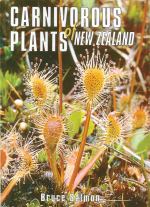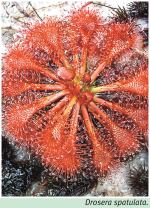 BOOK
REVIEWS BOOK
REVIEWS
Carnivorous
Plants
of New Zealand
Bruce Salmon
Ecosphere Publications
$NZ64.95
BRUCE SALMON is a carnivorous
plant connoisseur and his enthusiasm for these weird and wonderful
plants shines through in this authoritative new book.
Bruce was just a teenager
when he first started collecting carnivorous plants - he's now the
President of the New Zealand Carnivorous Plant Society. He is, you
could say, consumed by these insect chomping, sticky-trap producing
members of the plant world.
 The
first thing that surprises about this book is how attractive our
native carnivorous plants are, even if they are bizarre. They are,
as Bruce says, "both beautiful and deadly - masters of their boggy
realm". The
first thing that surprises about this book is how attractive our
native carnivorous plants are, even if they are bizarre. They are,
as Bruce says, "both beautiful and deadly - masters of their boggy
realm".
There are two main families:
the droseras, or sundews, with their sticky natural flytraps, and
the Utricularia, or bladderworts. Bladderworts are the
most common plant carnivores, with 215 species worldwide, including
five native New Zealand species. The drosera family includes 160
species, making it the second largest group in the world, although
only seven species occur naturally here.
This book covers a dozen
different species in all. Some, like Drosera binata, are
quite spectacular. This sundew has pretty single flowers carried
above a clump of sticky red, tentacle-like stems. It's easy to imagine
how excited the author must have been to see them growing en masse
in the wild, in sphagnum moss at Lake Ruapani in the Urewera National
Park.
Drosera pygmaea caught
my interest too (I'm sure anyone with an interest in fascinating
plants will find, as I did, that as soon as you see the photos in
this book you'll want to start your own carnivorous plant collection).
Drosera pygmaea has
red flowers - from a distance these little plants look like a cluster
of fallen pohutukawa blooms. Close up, they look extra-terrestrial
as well as extraordinary.
Bladderworts, despite
their less than appealing common name, have the daintiest little
flowers, similar to a single snapdragon. They use a unique vacuum
trapping mechanism to ensnare their prey, luring them in through
a one-way trap door. Vicious, but effective!
This is an intriguing
book about intriguing plants. There are numerous close-up photographs
and black and white botanic drawings make it possible to see exactly
how these plants go about their deadly business.
If you're already interested
in carnivorous plants, this book is a must-have. And if you're not,
by the time you've finished reading Carnivorous Plants of New
Zealand, you will be.
Weekend
Gardener, Issue 95, March 28-April 10, 2002, Page 28
Reproduced with permission from the former Weekend Gardener magazine. The views expressed here are not necessarily those of the RNZIH
|
 |
 |
|

